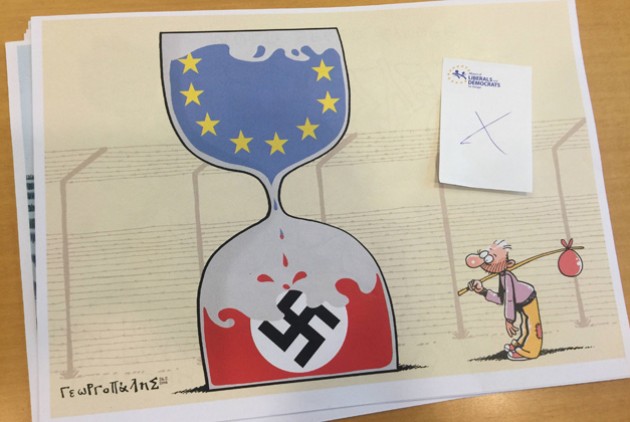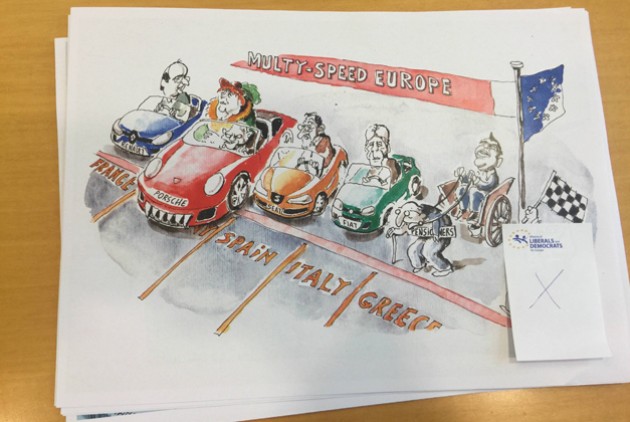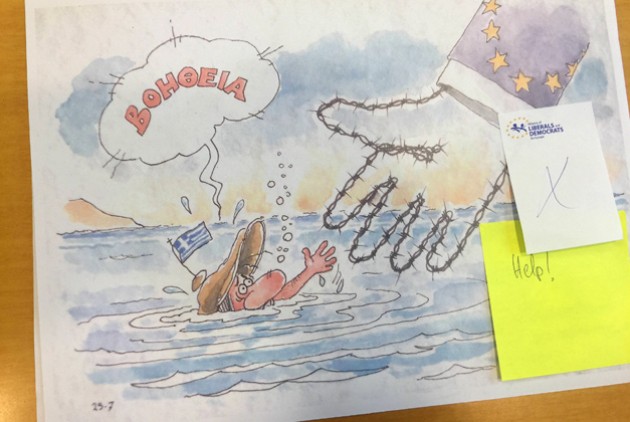Index relies entirely on the support of donors and readers to do its work.
Help us keep amplifying censored voices today.
[vc_row][vc_column][vc_single_image image=”107234″ img_size=”full”][vc_column_text]EU leaders from Cyprus, France, Greece, Italy, Portugal, and Spain are urged to address the ongoing impunity in the case of assassinated journalist Daphne Caruana Galizia
To: Mr Emmanuel Macron, President of France; Mr Giuseppe Conte, Prime Minister of Italy; Mr Nicos Anastasiades, President of Cyprus; Mr Alexis Tsipras, Prime Minister of Greece; Mr António Costa, Prime Minister of Portugal; and Mr Pedro Sánchez, Prime Minister of Spain.
13 June 2019
Your excellencies,
Journalist Daphne Caruana Galizia was assassinated in Malta by a car bomb on 16 October 2017. There is no process inquiring into the circumstances of the murder. We, the undersigned organisations, have advocated extensively for justice in the case and are closely monitoring the process on the ground.
A report on the assassination, titled “Daphne Caruana Galizia’s assassination and the rule of law, in Malta and beyond: ensuring that the whole truth emerges”, by the Special Rapporteur of the Parliamentary Assembly of the Council of Europe (PACE), Pieter Omtzigt, was adopted by the Legal Affairs and Human Rights Committee meeting in Paris on 29 May 2019.
The report highlights a series of concerns relating to the investigation into the murder of Daphne Caruana Galizia, and Malta is requested to establish an independent and impartial public inquiry within three months to determine whether the state could have prevented the assassination – a call we have made repeatedly. The Committee noted fundamental weaknesses in Malta’s system of democratic checks and balances, seriously undermining the rule of law. This is an alarming situation, particularly in a Council of Europe and European Union member state. The Maltese authorities are called upon to take steps to end the prevailing climate of impunity.
So far, the Maltese government has blocked a public inquiry, leaving journalists continuing to work in Malta at great risk and forcing Galizia’s family to litigate the Prime Minister’s refusal to hold a public inquiry into the assassination. Only a public inquiry can determine how best to guarantee the safety of journalists and prevent future attacks. The Venice Commission Opinion on Malta states Malta’s positive obligations in relation to the assassination of Daphne Caruana Galizia. A public inquiry is the only process that can effectively address these positive obligations. The call for a public inquiry is supported by a resolution by the European Parliament which requests the Maltese government to launch a public inquiry, and calls on the EU institutions and the Member States to initiate an independent international public inquiry into the murder and the alleged cases of corruption, financial crimes, money laundering, fraud and tax evasion reported by the journalist.
By signing the Sibiu Declaration, you have pledged to safeguard Europe’s democratic values and the rule of law. We therefore urge you to address the matter of safety of journalists and ongoing impunity in the case of Daphne Caruana Galizia in your meeting with Prime Minister Muscat in Valletta on 14 June.
Thank you for your attention.
Kind regards,
Dr Lutz Kinkel, Managing Director, European Centre for Press and Media Freedom (ECPMF)
Sarah Clarke, Head of Europe and Central Asia, ARTICLE 19
Annie Game, Executive Director, IFEX
Joy Hyvarinen, Head of Advocacy, Index on Censorship
Ravi R. Prasad, Director of Advocacy, International Press Institute (IPI)
Carles Torner, Executive Director, PEN International
Rebecca Vincent, UK Bureau Director, Reporters Without Borders (RSF)[/vc_column_text][/vc_column][/vc_row][vc_row][vc_column][vc_basic_grid post_type=”post” max_items=”4″ element_width=”6″ grid_id=”vc_gid:1560437482746-8cffafe9-48c7-1″ taxonomies=”8996″][/vc_column][/vc_row]
[vc_row][vc_column][vc_single_image image=”96965″ img_size=”full” alignment=”center” onclick=”custom_link” link=”https://mappingmediafreedom.org/#/”][vc_column_text]Despite an ongoing trial that has sapped its popular appeal, members of the Greek press are still under pressure from neo-Nazi, far-right organisation Golden Dawn. Journalists have been targeted with libel charges and physical violence.
Two journalists working for the Ethnos newspaper, Maria Psara and Lefteris Bidelas, who revealed criminal activity associated with Golden Dawn, are facing a lawsuit demanding €300,000 ($352,377). The next hearing in the case, which was filed by Golden Dawn MP Ilias Kasidiaris, is scheduled for 14 December 2017.
“[Golden Dawn] are seeking our moral and economic extermination. They want us to stop writing,” Psara told Index on Censorship’s project Mapping Media Freedom, explaining that due to delays in the Greek legal system, these procedures normally may last for years, obliging journalists to spend days in courts.
The case stems from a physical assault on New Democracy MP Giorgos Koumoutsakos, which took place during a November 2015 protest in Athens, Psara and Bidelas explain. The perpetrators of the violence were allegedly a group of far-right supporters. In a news article about the incident, journalists Psara and Bidelas published an information coming from Koumoutsakos, that an eyewitness had called his office on that evening and had stated that he had heard the Kasidiaris tell a man to attack Koumoutsakos. Further, according to the account, the witness said that Kasidiaris shouted “Finish! Finish!” to the group as they were assaulting Koumoutsakos.
According to Psara and Bidelas, they published what Koumoutsakos told them about the incident during a conference call with the CEO of the newspaper, following his report to the police. Kasidiaris denied the allegations and filed a libel suit, naming the journalists and the CEO of the newspaper as defendants.
Constant pressure
Psara and Bidelas told MMF that this is not the first time that far-right supporters have targeted them. Around ten lawsuits have been filed against them in criminal and civil courts. In another ongoing libel case against them a Greek police commander sued the journalists for publishing a September 2014 photograph of the officer sieg heiling in front of a Nazi train at the Nuremberg Transportation Museum. The journalists were found guilty in a civil case and charged with a fine of €3,000 ($3,525) each. An appeal is scheduled for February 2018.
“I began to cover Golden Dawn in 2012 when its chief, Nikos Michaloliakos was elected a municipal councilor in the City of Athens,” Psara says, adding that the first time Golden Dawn reacted to a story of hers was in 2013. “It was a story about Golden Dawn members assaulting the actors of a play called Jesus Christ Super Star.”
The targeting of Bidelas began after the murder of the anti-fascist rapper Nikos Fyssas in 2013. Following an investigation into the murder, Michaloliakos along with several other Golden Dawn MPs and members were arrested and held in pre-trial detention on suspicion of forming a criminal organisation. The trial began on 20 April 2015 and is still ongoing.
At the time, Psara and Bidelas published articles that revealed the structure of Golden Dawn as well as the group’s racist and violent activities. Among their sources were ex-Golden Dawn members, which annoyed the organisation’s leadership. “They were calling at the newspaper to complain and insult us. Sometimes they even threatened us,” Bidelas says.
Golden Dawn’s popularity grew in the aftermath of the Greek financial crisis and the backlash created by the refugee crisis that swept Europe. The party managed to enter the Greek Parliament in 2012 with 21 seats, which emboldened them to openly attack the entire political system. Journalists became one of their main targets.
“Fear is a key element in the Golden Dawn ideology,” Psara told MMF. “They have attacked journalists physically, including during protests, as well taking legal action against them. The aim was to instil fear and stop any negative reports. In other words, they were abusing justice in order to serve their political interests.”
Over the last two years, examples of physical assaults against journalists and photographers have not been in short supply, as recorded by Index on Censorship’s Mapping Media Freedom project. Journalists covering the refugee crisis often fell victim to far-right attacks. In response to these co-ordinated attacks, many journalists began to develop a common front against Golden Dawn.
“We had the absolute support of the newspaper and, when we made public the threats we were receiving, the support of our Union (ESIEA),” Bidelas says. “The support of individual colleagues was also touching.”
“We are definitely not the only ones in this. Many other journalists who dared to reveal the real face of Golden Dawn have become targets,” Psara says. “But what must be stressed it that we won’t bow to this pressure.”[/vc_column_text][/vc_column][/vc_row][vc_row][vc_column][vc_custom_heading text=”Mapping Media Freedom” use_theme_fonts=”yes”][vc_separator color=”black”][vc_row_inner][vc_column_inner width=”1/4″][vc_icon icon_fontawesome=”fa fa-times-circle” color=”black” background_style=”rounded” size=”xl” align=”right”][/vc_column_inner][vc_column_inner width=”3/4″][vc_column_text]
Since 24 May 2014, Mapping Media Freedom’s team of correspondents and partners have recorded and verified more than 3,700 violations against journalists and media outlets.
Index campaigns to protect journalists and media freedom. You can help us by submitting reports to Mapping Media Freedom.[/vc_column_text][/vc_column_inner][/vc_row_inner][vc_separator color=”black”][/vc_column][/vc_row][vc_row][vc_column][vc_custom_heading text=”Don’t lose your voice. Stay informed.” use_theme_fonts=”yes”][vc_separator color=”black”][vc_row_inner][vc_column_inner width=”1/2″][vc_column_text]Index on Censorship is a nonprofit that campaigns for and defends free expression worldwide. We publish work by censored writers and artists, promote debate, and monitor threats to free speech. We believe that everyone should be free to express themselves without fear of harm or persecution – no matter what their views.
Join our mailing list (or follow us on Twitter or Facebook) and we’ll send you our weekly newsletter about our activities defending free speech. We won’t share your personal information with anyone outside Index.[/vc_column_text][/vc_column_inner][vc_column_inner width=”1/2″][gravityform id=”20″ title=”false” description=”false” ajax=”false”][/vc_column_inner][/vc_row_inner][vc_separator color=”black”][/vc_column][/vc_row]
[vc_row][vc_column][vc_column_text]
The European Parliament is accused of censoring a series of political cartoons from Greece which were due to appear in an upcoming exhibition later this month.
The exhibition, organised by an MEP from Greece and an MEP from France, aimed to present political and humorous sketches created by cartoonists from the two countries and published in the press on the occasion of the 60th Anniversary of the Rome Treaty. However, Catherine Bearder, a British Liberal Democrat MEP from southeast England, who is responsible for the cultural and artistic events sponsored by other members, decided to remove 12 out of 28 cartoons, all created by Greek cartoonists, claiming that the artwork contained “controversial content”.
Index on Censorship approached Bearder for comment but at the time of writing she had not replied.
According to the regulation of the European Parliament, all cultural events and exhibitions have to be checked so that “under no circumstances be offensive or of an inflammatory nature or contradictory to the values” of the EU.
The Greek MEP, Stelios Kouloglou denounced the “unprecedented” form of censorship by the European Parliament. “The content of the censored cartoons did not insult the values of the European Union in any way,” Kouloglou said in a press conference in Strasbourg on Tuesday, 12 September.
The 12 cartoons are critical of the EU and focus mainly on the way the EU – and especially Germany – dealt with the Greek crisis. One of the censored cartoons features the starting line for a race, with Germany in a Porsche sports car, Italy, Spain and France in old cars and Greece in a chariot being pulled by a pensioner.
 Breader presented the upcoming German election as another reason to discard the 12 cartoons, although the exhibition is scheduled to take place after the election.
Breader presented the upcoming German election as another reason to discard the 12 cartoons, although the exhibition is scheduled to take place after the election.
“The right for artistic creation and freedom of expression are part of the European Union’s fundamental values. This arbitrary decision violates them” Kouloglou remarked in a letter of complaint addressed to the president of the European Parliament, Antonio Tajani.
The Journalists’ Union of the Athens Daily Newspapers also denounced the incident of censorship asking for the intervention of the European and International Federation of Journalists.

Credit: Stelios Kouloglou, MEP[/vc_column_text][/vc_column][/vc_row][vc_row][vc_column][vc_basic_grid post_type=”post” max_items=”4″ element_width=”6″ grid_id=”vc_gid:1505898132982-6897be5b-fada-1″ taxonomies=”5768, 1888″][/vc_column][/vc_row]
[vc_row][vc_column][vc_single_image image=”81193″ img_size=”full”][vc_column_text]Each week, Index on Censorship’s Mapping Media Freedom project verifies threats, violations and limitations faced by the media throughout the European Union and neighbouring countries. Here are five recent reports that give us cause for concern.
A Hatay court issued a detention order for Ceren Taşkin, a reporter for the local newspaper Hatay Ses, on the basis of her social media posts, news website Gazete Karinca reported.
Taşkin was detained earlier for “spreading propaganda for a terrorist group” via her social media posts. Taşkin was arrested and sent to prison on 12 January on the same charges.
Her arrest brings the number of journalists in prison to 148, Platform 24 reported.
The National Radio and TV Council has banned independent Russian television channel Dozhd from broadcasting in the country.
“The channel portrayed the administrative border between Crimea and Kherson region as the border between Ukraine and Russia,” national council member Serhiy Kostynskyy said during a council meeting, Interfax-Ukraine reported.
According to Kostynskyy, the channel repeatedly violated Ukrainian law in 2016 by broadcasting Russian advertising and having Dozhd journalists illegally enter annexed Crimea from the Russian Federation without receiving special permission.
The ban is set to be officially published by the authorities on 16 January, Interfax-Ukraine reported.
Dozhd Director Natalya Sindeyeva said that the channel is broadcasting through IP-connection without direct commercial advertising in Ukraine and follows the Russian Federation law requiring that media outlets use maps to show Crimea as part of Russia.
Dunja Mijatovic, media freedom representative at the Organization for Security and Cooperation in Europe, wrote on her Twitter that this decision is “very damaging to media pluralism in Ukraine.”
Police arrested Giannis Kourtakis, publisher of Parapolitika newspaper, and its director, Panayiotis Tzenos, following a lawsuit filed against them for libel and extortion by the defence minister and leader of the Independent Greeks Party (ANEL), Panos Kammenos, the news website SKAI reports.
Kourtakis said he voluntarily went to police headquarters after being informed about the lawsuit, while director Panagiotis Tzenos was arrested in his Athens office.
ANEL issued a statement stressing that the lawsuit was prompted by allegedly slanderous claims about Kammenos’s son, saying that he was an “anarchist” and involved in a terrorist group on their radio programme which aired on 9 January.
In July 2015, Kammenos gave Athens press union (ESIEA) a list of journalists who had allegedly received improper funding through advertising from the state health entity KEELPNO, which included the Parapolitika executives.
According to SKAI, Kammenos claims that the journalists made slanderous statements about his son in order to make him retract allegations that the Parapolitika executives were receiving funding.
The public prosecutor who investigated the lawsuit has since reportedly dropped charges of criminal extortion.
Greece’s main journalists’ union and opposition parties have expressed concern over the general tendency of police’s interventions to journalists’ offices.
“Journalism must be exercised according to specific rules, but also press freedom must be defended and protected,” the Journalists’ Union of the Athens Daily Newspapers writes in its statement.
Vladislav Ryazantcev, correspondent for the independent news agency Caucasian Knot, reported on Facebook that he was assaulted by five unknown individuals whose faces were covered by scarves.
According to Ryazantcev, one of them grabbed his hand and asked him to “follow him for a talk.” Right after that an additional four individuals came up and started to hit the journalist on the head.
Ryazantcev reported that bystanders then helped rescued him.
“I do not know what the attack is connected to,” he wrote on Facebook. He later filed a complaint to the police.
The day before on 9 January, Magomed Daudov, speaker of the Chechen parliament, published threats against editor-in-chief of the Caucasian Knot, Grigori Shvedov, on Instagram.
A TV crew working for TF1 channel was reportedly assaulted in Compiègne while trying to film a building set to be emptied of its inhabitants because of alleged high criminality linked to drug trafficking, Courrier Picard reported.
“We tried to film a story there this morning. Our crew was attacked and stoned by thugs who stole our camera in this unlawful zone. It was very violent,” TF1 presenter Jean-Pierre Pernaud said. The assault occurred in the Close des Roses neighbourhood.
One of the journalists told Courrier Picard that the channel would file a complaint.[/vc_column_text][vc_column_text]
Click on the bubbles to view reports or double-click to zoom in on specific regions. The full site can be accessed at https://mappingmediafreedom.org/
[/vc_column_text][/vc_column][/vc_row]